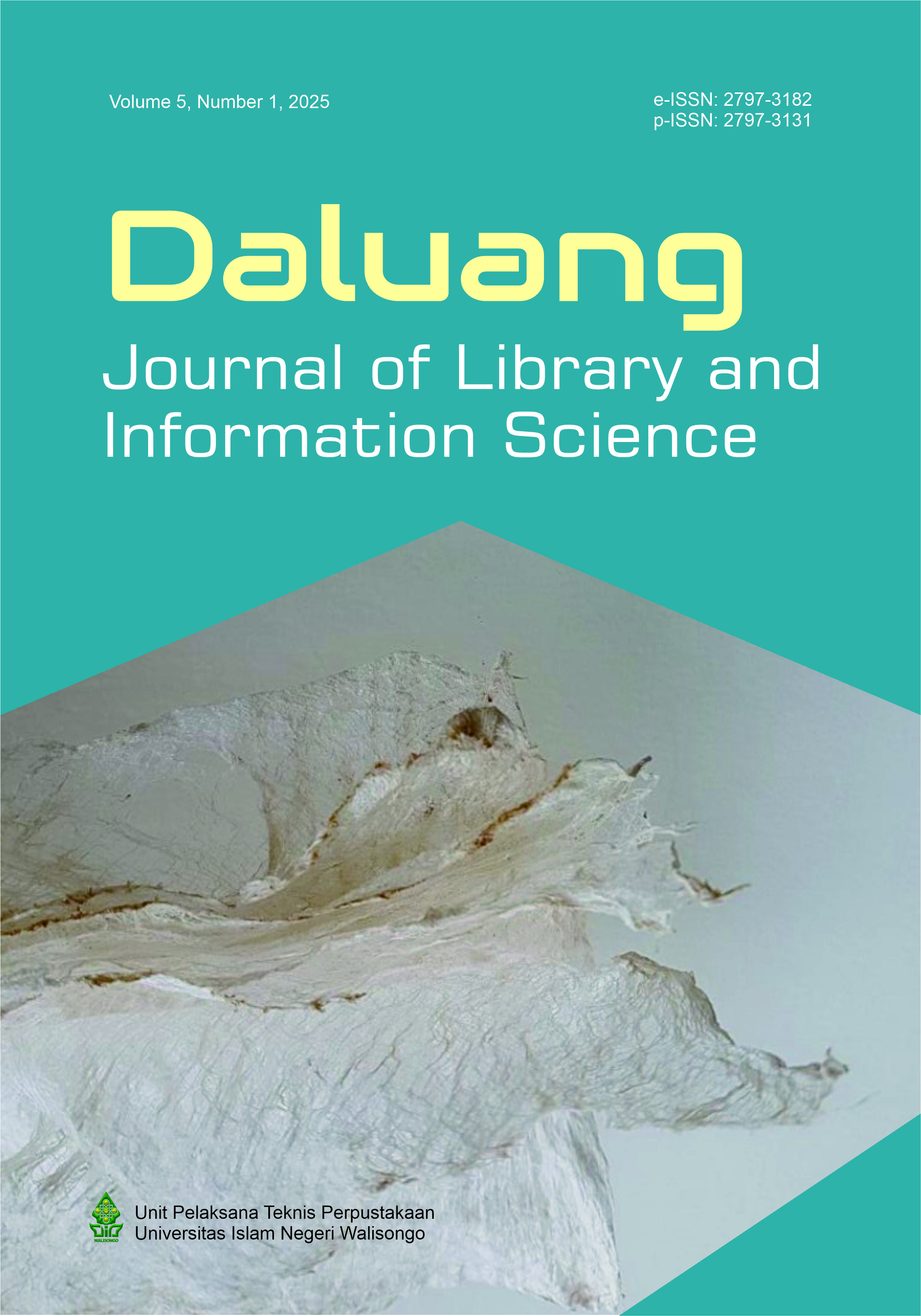The Awareness of plagiarism among university teachers in Sri Lankan Universities
Main Article Content
Abstract
Purpose. This study explores the awareness of plagiarism among university lecturers in Sri Lanka, with particular relevance to the field of library and information science. It highlights the crucial role of information literacy in addressing plagiarism in academic settings. As academic dishonesty, especially plagiarism, continues to rise, understanding faculty awareness is essential for fostering academic integrity and designing effective prevention strategies.
Methodology. A quantitative approach was used, employing an online questionnaire distributed to academics from 17 Sri Lankan universities. A convenience sampling technique selected 104 respondents. Data were analyzed using SPSS through descriptive statistics and Pearson Chi-Square tests to examine relationships between variables.
Results and Discussions. About 55.3% of respondents reported clear definitions of plagiarism within their departments, while 22.3% indicated uncertainty or lack of clarity. Most participants (95.2%) discussed plagiarism with students, though awareness varied by academic field. Faculties of aesthetics and commerce showed greater participation in awareness programs than engineering and technology. Additionally, 60.58% of respondents said their institutions used plagiarism detection software.
Conclusion. The study indicates generally positive awareness of plagiarism among Sri Lankan university lecturers, but notable gaps exist in some academic areas. The adoption of detection software is a significant step, yet there remains a need for better training and targeted awareness efforts tailored to faculty needs. This research contributes to discussions on academic integrity and emphasizes the importance of continuous education and institutional commitment to preventing plagiarism in higher education.
Downloads
Article Details

This work is licensed under a Creative Commons Attribution-NonCommercial-NoDerivatives 4.0 International License.
This work is licensed under a Creative Commons Attribution-NonCommercial-NoDerivatives 4.0 International License.
Articles published in Daluang Journal of Library and information Science are available under Creative Commons Attribution Non-Commercial No Derivatives Licence (CC BY-NC-ND 4.0). Authors retain copyright in their work and grant Daluang Journal of Library and information Science right of first publication under CC BY-NC-ND 4.0. Users have the right to read, download, copy, distribute, print, search, or link to the full texts of articles in this journal, and to use them for any other lawful purpose.
Articles published in Daluang Journal of Library and information Science can be copied, communicated and shared in their published form for non-commercial purposes provided full attribution is given to the author and the journal. Authors are able to enter into separate, additional contractual arrangements for the non-exclusive distribution of the journal's published version of the work (e.g., post it to an institutional repository or publish it in a book), with an acknowledgment of its initial publication in this journal.
This copyright notice applies to articles published in Daluang Journal of Library and information Science volumes 1 onwards.
References
Bennett, K. K., Behrendt, L. S., & Boothby, J. L. (2011). Instructor perceptions of plagiarism: Are we finding common ground? Teaching of Psychology, 38(1), 29–35. https://doi.org/10.1177/0098628310390851
Breen, L., & Maassen, M. (2005). Reducing the incidence of plagiarism in an undergraduate course: The role of education. Issues in Educational Research, 15(1), 1–16. https://www.iier.org.au/iier15/breen.html
Bretag, T. (2018). Academic integrity. Oxford research encyclopedia of business and management. https://doi.org/10.1093/acre-fore/9780190224851.013.147
Dávila Morán, R. C. (2022). The perception of academic plagiarism in industrial engineering students at a Public University in Lima. Publications, 10(4). https://doi.org/10.3390/publications10040041
Eaton, S. E. (2021). Plagiarism in higher education. Plagiarism in Higher Education, March. https://doi.org/10.5040/9798400697142
Giannakouli, V., Vraimaki, E., Koulouris, A., Kokkinos, D., Kouis, D., Kyprianos, K., & Triantafyllou, I. (2023). How academic librarians combat student plagiarism. Journal of Academic Librarianship, 49(6), 102785. https://doi.org/10.1016/j.acalib.2023.102785
Gibson, N. S., & Chester-Fangman, C. (2011). The librarian’s role in combating plagiarism. Reference Services Review, 39(1), 132–150. https://doi.org/10.1108/00907321111108169
Hascher, T., & Waber, J. (2021). Teacher well-being: A systematic review of the research literature from 2000–2019. Educational Research Review, 34(October), 100411. https://doi.org/10.1016/j.edurev.2021.100411
Hyytinen, H., & Löfström, E. (2017). Reactively, proactively, implicitly, explicitly? Academics’ pedagogical conceptions of how to promote research ethics and integrity. Journal of Academic Ethics, 15(1), 23–41. https://doi.org/10.1007/s10805-016-9271-9
Ives, B., & Nehrkorn, A. (2019). A research review: Post-secondary interventions to improve academic integrity. Prevention and detection of academic misconduct in higher education, 39-62. http://doi.org/10.4018/978-1-5225-7531-3.ch002
Khan, A., Richardson, J., & Izhar, M. (2021). Awareness about plagiarism and the effectiveness of library literacy program towards its deterrence: A perspective of postgraduate resident doctors. Global Knowledge, Memory and Communication, 70(8–9), 731–755. https://doi.org/10.1108/GKMC-08-2020-0130
Lau, G. K. K., Yuen, A. H. K., & Park, J. (2013). Toward an analytical model of ethical decision making in plagiarism. Ethics & Behavior, 23(5), 360–377. https://doi.org/10.1080/10508422.2013.787360
McCabe, D. L., Treviño, L. K., & Butterfield, K. D. (2001). Cheating in academic institutions: A decade of research. Ethics and Behavior, 11(3), 219–232. https://doi.org/10.1207/S15327019EB1103_2
Mulenga, R., & Shilongo, H. (2024). Academic integrity in higher education: Understanding and addressing plagiarism. Acta Pedagogia Asiana, 3(1), 30–43. https://doi.org/10.53623/apga.v3i1.337
Mustapha, R., Abdullah, Z., Mahmud, M., AisyahMalkan, S. N., & Mohamed, A. (2020). Academic dishonesty in current years comparison (2018 to 2020): The Malaysian higher education evidence. Solid State Technology, 63(6), 1109–1122. https://solidstatetechnology.us/index.php/JSST/article/view/2192
Palmquist, M. (2011). The Bedford researcher (4th ed.). Bedford/St. Martin’s.
Perkins, M., Gezgin, U. B., & Roe, J. (2020). Reducing plagiarism through academic misconduct education. International Journal for Educational Integrity, 16(1), 1–15. https://doi.org/10.1007/s40979-020-00052-8
Sisti, D. A. (2007). How do high school students justify Internet plagiarism? Ethics and Behavior, 17(3), 215–231. https://doi.org/10.1080/10508420701519163
Tsoni, R., & Lionarakis, A. (2015). Plagiarism in higher education: The academics’ perceptions. Proceedings of 2014 International Conference on Interactive Mobile Communication Technologies and Learning, IMCL 2014, Imcl, 296–300. https://doi.org/10.1109/IMCTL.2014.7011151



